Is There Anything New in the New-Right's Critiques of Liberalism?
Yes and No

Today, we present to you the latest installment from the Liberalism for the 21st Century conference hosted by ISMA, our publisher, last month. The conference has received rave reviews from Damon Linker, Luis Parrales at The Dispatch, and Cathy Young at The Bulwark.
The panel featured today, “Post-Liberal Critiques: A Response,” was smart, substantive, poetic, and funny. In short, first rate—so don’t miss it.
Moderated by our contributor, Jacob T. Levy, Tomlinson Professor of Political Theory at McGill University, one of the most erudite political theorists in the progressive classical liberal tradition, it featured: Columbia University’s Mark Lilla, author of The Once and Future Liberal—although a political theorist by training, his words have a literary quality, as you will see, and he seamlessly weaves insights from history, political theory, philosophy, and social sciences; Brooking Institution’s William Galston, a former professor and dean at the University of Maryland, a deputy assistant to President Clinton, whose brilliant book, Anti Pluralism: the Populist Threat to Liberal Democracy, is of particular importance to us here at The UnPopulist; and David French, a conservative columnist at The New York Times, whose courageous insistence that his side succumbs to Donald Trump and MAGA at the risk of losing its soul is nothing short of inspirational.
Below is an edited transcript of their conversation but we encourage you to watch the video of this panel discussion in its entirety, including the audience Q&A section, which contains an epic exchange about feminism and masculinity with former Princeton dean, Anne-Marie Slaughter, a speaker on another panel.
The following transcript of the panel discussion has been adjusted for flow and clarity.
Jacob T. Levy: We meet today not only a day or so after the National Conservatism conference that is casting a dark shadow that ISMA is trying to cast a light to—but also on the morning when Viktor Orbán and Donald Trump are scheduled to have a meeting at Mar-a-Lago. The National Conservatism conference arose to fill the intellectual gap that was left when Trump rose to the presidency without the support, and indeed very often against the opposition of, traditional movement conservative intellectuals—and without a strong intellectual theoretical agenda of his own. I think it’s safe to say [NatCons] sought to fill that vacuum.
So I want to start this morning’s conversation with two main questions about post-liberal theories and critiques. [The first is:] What is the relationship between the crisis of liberal politics—especially over the last decade, worldwide—and the development of new theoretical critiques of liberalism, not only non-liberal, but avowedly post-liberal? Post-liberal critiques have oriented themselves around the existence of a notional global liberal order, or of existing liberal societies and of liberal theories. What is the relationship between the crisis in the political world and the development of those ideas in the last 10 or so years? They might have arisen in parallel. They might have just proceeded independently in response to similar facts in the world, a similar crisis in liberal society or liberal ideas. It might be that what happened in politics has merely attracted or supported ideas. This can go any number of ways. Then there’s the mere propagandist, there’s the court flatterer, there’s the rush to fill a vacuum. But there are cases that are more than that as well—attempts to understand and rationalize what has happened in the political world. And there is the category Mark Lilla has usefully given us, of the tyrannophilic intellectual who sees in the rise of a new kind of political power an opportunity to put forward ideas for that figure to implement. But it might also be that ideas themselves have helped to shape the political world. And that what we’ve seen develop, by way of critiques of liberal society, has independent force in politics, and I’m going to encourage our panelists to talk about those things.
The other question with which I’d like to begin is simply on the relationship between this post-liberal school and more traditional critiques of liberal society, critiques of the sort that our panelists have been engaging with all through their careers. What is new? What is new that is also interesting? What is new that is also interesting and potentially true? Are there new intellectual challenges in post-liberalism that liberal theory or liberal society really must grapple with and engage with, and the answer might be no. It might be that all the interesting ground was already covered, and that what we’re encountering in post-liberalism is merely an attempt to dress it up in new, politically opportunistic or social media friendly terms. But I suspect there’s something more to be said than that.
Mark Lilla: Before I directly address the question … I recently wrote a long piece in The New York Review Books, not only about the usual [post-liberal] suspects who have been writing, but also the intellectual petri dish in which all of these things are growing—and it’s led me to think about the sort of standard historical narrative that relates World War I to the cultural developments afterwards. In standard intellectual histories you’d read about the war breaking out in August and suddenly, everything in civilization crumbled before everyone’s eyes. And then the bodies started coming back. After that crisis, there were intellectual reactions and responses—artistic ones and political ones.
But over the past few decades, intellectual historians have been spending or focusing more attention on the atmosphere that had been created before the First World War. And the more you look at the period from the 1880s to 1914, the more you see that the apocalyptic mood following World War I actually started developing two and a half decades before. You see that in the decadent movements in French literature and French art. You see that in the eruption of interest in Nietzsche, once his works were publicized by a famous Dutch intellectual, who gives the first lectures on Nietzsche in the 1890s. Kierkegaard’s work is translated into German and then into other languages for the first time. And so you can see a kind of weather pattern developing before the First World War, which then teaches you that it was that that prepared the interpretation of the war as a huge break in history.
It was not that the war was the break in history and everyone reacted. But that an atmosphere had been created. Now I think we all too easily, and I’m as guilty of this as anyone, think about the relation of political ideas and political events in linear terms: an idea developed, got rooted in people’s minds, and fed into a political development—or the reverse: that something happened on the ground and that gave rise to ideas. And I think that was Jacob’s task to us. And I want to encourage us, instead, to pay attention to the kind of cultural weather. It’s not that you can point directly from one book to one event or one event to one book, but rather little things contribute to the creation of an atmosphere, a weather pattern. There are low pressure fronts that move in. There are winds that blow in from a far coast. And there’s the annual El Nino. If you want to think about the metaphors of weather, they become much more helpful and make us attentive to little things that are going on everywhere that you can’t prove in a court of law but that have directly led to something.
“Liberalism, in its institutional arrangements is, above all, an effort to create un-toppable sea walls against tyranny. The Constitution of the United States is the greatest anti-tyranny document, I believe, ever written as a practical prescription for a society.” — William Galston
But if you follow political events long enough, attentively, and here I’m going to play my old man’s card, you know when it smells like it’s going to rain. And that’s why it’s so important for people who study political ideas, and it’s something totally missing in our education and political theory and even in political history, to pay attention to cultural histories, to sort of pick up on these little things. Well, it smells like rain. And if you think it’s raining now, it may be raining a lot more in the future.
We’re in a situation now where an intellectual atmosphere has been created on the right that has helped to frame certain things that are going on in the world in such a way that they lead to a concrete political reaction. Many of the critiques of the economy, of the culture, of what's happened to community that post-liberals have offered, you can find somewhere else. If you look at Patrick Deneen’s first book, he doesn't even pretend it is novel. Rather, he pulls these things together. What's new and different is the development of a melodramatic historical dramaturgy. They have a story to tell. And the effect of that dramaturgy is that it's given every young person who kind of leans right and is unhappy with the present to pull out the little story and tell you why he’s or she’s feeling so bad.
I don't know how many of you are in this position of being lectured by an 18-year-old—who is just getting over acne—about the good old days. I try to bite my tongue and I listen. But one effect of this dramaturgy is that historical ages are defined by a key idea, in this case modernity. And it’s not just a concept that allows us to sort out things in the past that were different, had fundamental presuppositions that are different from today, but that this thing that has come over the horizon shows what's wrong with liberalism. A young person was speaking to me yesterday in one of the cocktail parties, saying that people are understandably disturbed by liberalism. By what particular things? And it turns out, a lot of these things were just life. There are things in life that happen and things that happen in history. But if they’re convinced that we live in liberalism, then everything within that that happens they relate in their mind to this thing, liberalism, and are put within this historical dramaturgy. And so you have a stock answer to everything. It reminded me the old Jewish joke about a young man who always wanted to be a broadcaster. He finally gets an interview, and he comes home and his brother is waiting for him, asks, “So did you get the job?” And he shakes his head. The brother says, “Why not?” And the young man answers [stuttering], “antis...s…s…semitism.” And today the answer to everything is l..l..iberalism is to blame.
Levy: Bill’s been more than I'm reasonably sure anyone else in the room, more than anyone else I know, involved in the bridging and moving back and forth between what was happening in political theory and what was happening in the world of politics. And he got to see what it was that people on both sides were doing and were looking for in the interaction. I'm not asking him to talk about his autobiography, but asking him to draw on his experience, to reflect on the current moment about what ideas and politics are doing with each other.
“One of the big misconceptions in post-liberal Christianity is the equation between liberalism and moral relativism, that liberalism is a version of moral relativism. It is not. … It is one of the only ways we figured out for people who hold very different world views to live together while continuing to hold and advance their very different world-views.” — David French
William Galston: I think it’s important to ask ourselves what kind of conversation we’re having, not only in this room, but also in the country and to some extent throughout the world. And my first thought is this: the reasons that people in countries as diverse as the United States, France, Hungary, India, and many others that I could name, have gravitated towards anti-liberal leaders have rather less to do with post-liberal principles than we would like to believe. There are certain theories about the relationship between political ideas and political practice that are self-flattering to people like us in the sense that they put us at the center of the action. And I guess I would plead for a little bit of decentering.
Ordinary people judged liberal democracy much more by its fruits than by its roots. They may believe in the principles, but those principles are going to be measured against what a form of government at a particular time actually does for them. And if you ask most people, what are they looking for from a second Trump term? They will say things like, “Well, there weren't any new wars when Trump was president and we’d like to go back to that. We’d like to go back to a time of low inflation and rapid income gains, both of which occurred during the Trump administration. We’d like to go back to a period that to us seemed stable”—although perhaps to others it did not. They want to feel secure in their lives, in their communities and in their understanding of themselves and their place in the country. And I would argue that it’s the failure of liberal democracies to deliver the fruits that people have grown to expect that created an opening for post-liberal theories and leaders. I’m going to think a little bit out loud about what some of those things are, but I would stress some permanencies that aren’t just rooted in the moment.
Permanency Number One: I went to the National Conservatism convention and what I saw was a sea of young people. Speakers weren’t young. The audience was. What was that all about? Well, the new is exciting. Dissent can feel like a form of bravery. We are the establishment. We may not want to think of ourselves that way, but we are. And there are particular joys of going against something that’s established, particularly if you’re young, you have things to gain and not much to lose.
Permanency Number Two: Liberalism, in its institutional arrangements is, above all, an effort to create un-toppable sea walls against tyranny. The Constitution of the United States is the greatest anti-tyranny document, I believe, ever written as a practical prescription for a society. But resisting tyranny is not the same thing as eradicating St. Augustine's “libido dominandi” from the souls of men. And as Abraham Lincoln warned us in his youthful Lyceum address, the tribe of the ego is coeval with humanity. There are people who are not going to be satisfied with an ordinary existence or even with a piece of power. They want it all, and people who want all of power in their own hands are going to oppose liberal governance, root and branch, because it is the strongest opponent.
Permanency Number Three: I have been rereading the Declaration of Independence, with a passion, and I’m noticing things that I didn’t notice before. Everybody remembers the second part of the Declaration, Thomas Jefferson’s finest hour. But it begins with the idea of separate and distinct peoples. What is the relationship between a separate and distinct people, on the one hand, and the universal principles of the Declaration, on the other? A balance has to be struck between universalism and particularism. And I think a lot of people have come to feel that liberals have disrupted that balance in favor of universalism, so that we are no longer able to offer a principled defense that we believe in national borders and the need to secure them. But core to an idea of democracy, liberal democracy, as well as democracy, is the idea of the right of the people to constitute the demos. So when Donald Trump says, “if you don't have borders, you don't have a country,” he’s right. And we have to take that on board.
Finally, we have to accept the fact, if we want to make a deep defense of liberalism … we have to take the deepest criticisms of liberalism on board.
Another feature of the Declaration of Independence that’s jumped out at me more than ever is the simple phrase, “we hold these truths to be self-evident.” That is a strength, but also a weakness. If you hold things to be self-evident, you may forget the arguments in favor of them. You may forget the fact that the invocation of human equality stands in some tension with observable natural differences. You may tend to forget the fact that liberty taken to an extreme can give rise to license. You may be tempted to forget the fact that a society based on individual rights cannot long endure without some sense of responsibility to the community. You can’t forget the fact that while we liberals root the legitimacy of the government in the consent of people, that others will equally sincerely say that all legitimate authority flows from God. And that is a permanent basis for opposition to a liberal order. We were shocked when we were attacked by Islamic fundamentalists, but they were attacking not just out of anti-colonial resentment, but in defense of a proposition about where the authority of government and where the authority for the governance of daily life comes from. I could go on in this vein.
In conclusion, there is an attack, not only on liberal principles, but also on what I’ll call liberal sociology, the liberal way of life. We liberals favor peace. Many anti-liberals see virtues in conflict and in war. We accept, and even laud, heterogeneity, but in many quarters, there’s a longing for homogeneity. We applaud dynamism, but dynamism and the desire of many people for stability don’t coexist very easily. We cherish the ability to challenge authority, but many people experience challenges to authority as sources of instability. They want authority. Even if that authority cannot fully justify itself before the bar of reason. We fear tyranny. They want leaders who can act boldly.
Whether you’re talking about liberal principles or liberal sociology, you know, there’s another side of the argument that we will be disarmed to fight, unless we take it on board and think it through.
Levy: David, I want to prompt you about novelty. You were in a position to see changes happening in very real time in 2014-2016, before the Claremont Review of Books launched forth [in backing Trump’s incipient MAGA movement and publishing it’s infamous Flight 93 essay, a vitriolic condemnation of liberal dominance in America]. You were seeing, particularly this younger audience, working out their complaint with you as the object of their demonology. You saw something new happening—was the something new … intellectually or morally significant? I want to use you to potentially push back on the idea of mere permanence. Is there something new going on?
David French: I think that the something new that was going on was, as Mark was saying, like the smell of the rain … you remember Occupy Wall Street? A lot of it was really incoherent. People took over a plot of ground to protest things that were not going right post the Great Recession. You’re still in Iraq. You had this sense that things had not been working.
A lot of the post-liberals on the right came in, and they had a full spectrum explanation for this that went well beyond politics. For young men in particular who felt that there was something wrong in this country, especially about what it means to be a man, they really scratched where it was itching. Before anyone was talking about this in elite circles, it was very apparent that we were already into a crisis of masculinity. The deaths of despair, which disproportionately hit single men, were already rising among single and divorced men. We were seeing men falling behind in school to women. We were seeing widespread prescriptions of medication just being handed out to young men who were, in many ways, often just kind of going through what young boys do. (A middle school boy like me could present as a troubled person just by being an eighth grader.) So you actually had a lot of negative things occurring.
At the same time, many of these thick institutions that had been present in our lives were beginning to crumble and fray. So this is a few years after Bowling Alone, one of the more prescient and important books I’ve ever read about the effects of social isolation and atomization. And so all of this is kind of coming together—there’s the smell of the rain, there’s a deep discontent—and in comes the post-liberals focused on young men. It is important to understand that post-liberalism is not just an intellectual movement, it’s also an aesthetic movement. It’s a lifestyle, it’s a culture.
And so in many ways, it came in with a great explanation, which was that as soon as a society adopts the principles of liberal democracy fully, it starts the ticking of the doomsday clock. Because what liberalism does is it degrades the pre-liberal institutions, family, church, etc., that are necessary for human flourishing. It starts a process of decay—that liberal defenders of liberal democracy would say is a healthy testing: not letting any institution in liberalism getting off scott free. Nobody gets to live the unexamined life under liberalism. So if you’re part of a big religious institution, you’re going to be questioned, you’re going to face questioning, and you’re going to face critique. And some institutions don’t do well in the face of that. Some do better than others, but [post-liberals] see this as the degradation of institutions.
They wrote they grew up in an era of atomization and isolation. When I was a young Gen Xer, the best generation, I was a latchkey kid. For some of us, that was fine, and for a lot of us, it was really not fine at all. I’m such a nerd that I took advantage my unlimited freedom as a middle schooler to organize a neighborhood chess tournament. But that’s not everybody’s latchkey experience. And so my generation of parents and younger boomer parents said, “No, we’re not going to do that.” We have declining birth rates in this country, but we have increasing amount of time that parents spend with their children, which kind of disrupts the parental selfishness thesis. But what we said is, “this is not going to happen to my kids.” We created the super-managed childhood. And so whereas we would work out disputes ourselves, we have a situation where kids are growing up with highly managed childhoods which teaches them, in the event of conflict, to do what? Appeal to authority.
So in 2015, Greg Lukianoff at FIRE began to notice the demands for censorship and suppression in higher education were not as much coming from the top-down anymore. When I started doing my free speech work on college campuses, 99% of the time, the censorship and the speech codes were a top-down imposition. What we began to see, beginning in 2014, was a lot of the demands for censorship were now coming from kids 18, 19 years old, saying, “I don't feel good about this situation. Authority, fix it.” Combine this appeal to authority with the genuine sense of isolation, atomization and it is no accident that people who are more lonely, who feel less of a sense of belonging, are drawn to these post-liberal movements.
But we cannot overlook the aesthetic. They said liberalism is degrading the things that you love. They also said liberals are a bunch of weak, unmasculine people. Post-liberalism drives a four-wheel drive. Post-liberalism has guns. Post-liberalism gets in the weight room. There’s a whole aesthetic to this. And so that began to create a powerful pull for young men.
“There’s a really striking, global, recurring pattern in the ways that gender and sexuality is talked about in post-liberalism, from Florida to Hungary—which expelled the CEU (George Soros’ Central European University) on the grounds that it had a Gender Studies department—to Russia, to, in different ways, India. There is an obsession with characterizing the decadent West, primarily through accounts of the western model of gender and sexuality.” — Jacob T. Levy
The liberal answer to that pull is not to denigrate what these young men really value. There is nothing inconsistent between liberalism and a devout religious faith. But what the post-liberals will say is that liberalism inherently denigrates your faith. There's nothing inconsistent between liberalism and martial courage or physical valor. The best illustration of that is in the conflict between Russia and Ukraine. Russia, the forces of religious authoritarianism, don’t underestimate the religious element of this. And Ukraine is on its way towards integration with the E.U. and liberal democracy. Who is demonstrating tremendous martial valor right now?
And so I think we have to have an answer that does not concede to post-liberals things that are good—such as courage, such as what it means to be a virtuous, masculine man, such as devout religious faith—and instead say that liberalism is, in many ways, the ideal home for all of these virtues. Where do we need martial courage in the defense against authoritarianism? Where does religion truly thrive? It is not within authoritarianism. It is within liberalism. And where can you, as a young man, actually find your way in a robust free market that rewards risk taking and entrepreneurialism? And we have to be able to teach these young men that the virtuous values that they’re seeking find a home and a place in liberalism.
Lilla: I’m going to throw a monkey wrench in my own thinking and note that maybe it’s precisely that our felt need to provide answers to the post-liberal questions is the problem. That assumes that liberalism is “a thing,” and that therefore this “thing” has to provide everything. It doesn’t. And you're walking into their trap if you are cowered into thinking that you need an account of the whole. I’m wondering whether we should resist the attempt to respond and write books about liberalism as a “way of life” and say, “liberalism is liberalism—you get a life;” that liberalism is liberalism, and valor is another thing, neither liberal nor not liberal. We can address these other things, but resist the need to respond in kind, because we’re ceding something that we shouldn’t cede.
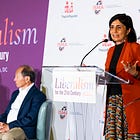
Revitalizing Liberalism Requires Understanding That It Is a Natural Response to Diversity Everywhere
French: I like that a lot. When I talked to young men about traditionally masculine virtues, strengths, physical courage, I was initially totally stumped as to what this has to do with liberalism. Throughout my entire history, coming up as a Reagan conservative, the idea that there would be something inconsistent between defense of liberal democracy and physical courage [was nonsensical]. To me, the two went hand in hand. You’re exactly right that they have looked at folks who have a lot of felt need and have created this bogeyman that liberalism is why you feel bad. We have to resist the urge to say, “Liberalism can make you feel good.” Instead, we have to say, “There is a complete misconception you're operating under as to what liberalism is doing and what liberalism is.” And one of the big misconceptions in post-liberal Christianity is the equation between liberalism and moral relativism, that liberalism is a version of moral relativism. It is not. It is not. It is one of the only ways we figured out for people who hold very different world-views to live together while continuing to hold and advance their very different world-views. Liberalism is not about flattening all our differences. It is instead about: How do you maintain your differences and maintain a community? But that message that liberalism is moral relativism has penetrated very deeply into particularly post-liberal Christianity.
Galston: I mean, there’s another way of putting this challenge. It’s not exactly a radical innovation to suggest that liberalism has pretty close to its core a distinction between what’s public and what’s private, and it’s that distinction that allows for the peaceful coexistence of difference. But that distinction between the public and the private runs up against a desire that many people have for wholeness. So if you look at the Catholic integralists, for example, their argument is that you can’t really live a good life unless the public and private are merged under a single doctrine. Another way of putting this is that liberalism is a kind of modus vivendi among differences. But some people ask themselves, “Why should I co-exist with what I believe to be false and evil? Why is tolerance of difference so good?” And the classic answer to that question is that the alternative to the tolerance of difference is bloody conflict. And there are some people who are not going to take that as a knockdown argument against engaging that conflict.
Liberalism represents a fundamental set of choices. I believe that they’re defensible choices. But as a Berlinian pluralist, I have to acknowledge that there are genuine goods that lie outside of the circle of choices that liberalism has made. I don’t see any way around that, which tells me that anti-liberalism is coeval with liberalism and will endure as long as liberalism does.
Levy: There are big picture liberal and liberal constitutional systems that we tend to focus on when we talk about the crisis of liberal politics or liberal orders in the world: The breakdown in democratic contestation and liberal constitutionalism; the rise of one party or semi-one party, autocratic systems; and the gradual crumbling of the post-war consensus on free trade and liberal economics.
But then there’s the things that draw people into their support for antiliberal parties. I’d identify them as a mixture of, on the one hand, discourses about global migration, about race, about civilizations and civilizational distinctions, and about religion as a component of civilizationalism—paradigmatically, we might think about Alexander Dugin and the story that he has told to Russians about Russia’s place in the new world order, but with lots of echoes around the world—and on the other hand, overlapping [discourses] around gender and sexuality. There’s a really striking, global, recurring pattern in the ways that gender and sexuality is talked about in post-liberalism, from Florida to Hungary—which expelled the CEU (George Soros’ Central European University) on the grounds that it had a Gender Studies Department—to Russia, to, in different ways, India. There is an obsession with characterizing the decadent West, primarily through accounts of the Western model of gender and sexuality.
Those discourses [about race, nation, and civilization, and about gender and sexuality] may be [genuine] arguments; especially in Catholic integralism, which is not only a U.S. phenomenon, but increasingly of Catholicism worldwide. These may be well-developed arguments. Or they may be mere defenses of habitual ways of holding or wielding power. Or maybe they are a toxic combination of those things.
Is there a bridge [between those two themes]? We see an attempted bridge in some of the post-liberal theorists, from Dugin to Deneen. On one hand, the world of free markets was a world of free migration. The world of free migration is a world of civilizational decadence [or decline]; there is a discourse in very many places that there are too many Muslims showing up, from Russia to India to the United States. That civilizational decadence [or decline] then somehow becomes also an account of a loss of gender hierarchy, or loss of traditional patterns of sexuality, or loss of traditional patterns of marriage. There's an attempt to connect those dots. Is there anything to that connection?
“Many of the critiques of the economy, of the culture, of what's happened to community that post-liberals have offered, you can find somewhere else. If you look at Patrick Deneen’s first book, he doesn't even pretend it is novel. Rather, he pulls these things together. What's new and different is the development of a melodramatic historical dramaturgy. They have a story to tell. And the effect of that dramaturgy is that it's given every young person who kind of leans right and is unhappy with the present to pull out the little story and tell you why he’s or she’s feeling so bad.” — Mark Lilla
And if so, does it get us anywhere toward understanding the crisis of public liberal representative constitutional democracy? We get this toxic politics—mixing together race/religion and civilization/sexuality—and then the outcome is autocracy. How do we get from one to the other?
French: I’m glad you brought up this issue, because I think that we have two things happening at once. One, you know, my colleague Ross Douthat uses this really great phrase to describe sort of pre-Civil Rights America that was dominated by a soft, white Protestant establishment. There’s no question that that white Protestant establishment has been diminished in its power and authority and that’s a good thing. But if you are in the white Protestant establishment, you’re going to experience even a justified loss of power as a loss. And a lot of times you’re not going to have a historical perspective on that. That loss is necessary if we’re going to actually have a truly pluralistic liberal democracy. The white Protestant establishment was actively unjust in many ways.
But let’s also not forget that there’s a giant blind spot left of center in talking about the movement for greater equality in areas of race, gender and sexuality as being entirely virtuous. And a lot of it has been very virtuous, but some of it, particularly on campuses, has been very hostile and illiberal itself.
So it’s a little rich to young, right post-liberals to hear all of a sudden, everyone rising up left of center saying, “We've got a post-liberalism problem” when, they're like, “I just graduated from a school with a speech code, okay? I just graduated from a school where, if I raised, even in the most kind way, an objection to, say, a biological male competing against biological females in athletics, I could probably face sanctioned punishment and certainly massive social exclusion.”
And then to hear the same wing of people saying, “Defend liberalism!”—they're like, “What are we talking about here?” And so there is a genuine problem with [white, Protestant] people angry that they have lost disproportionate power that they shouldn’t have had. And there is also a real issue created by left illiberalism. And these people are gonna be open to somebody who says that that was inflicted upon you and only I can protect you. If you can’t combat left illiberalism, and you’re left of center, ultimately, you’re going to be part of the problem.
To watch the Liberalism for the 21st Century conference in full, we’ve created a video playlist on YouTube. Don’t forget to subscribe to our channel so you never miss a video we release.
© The UnPopulist, 2024



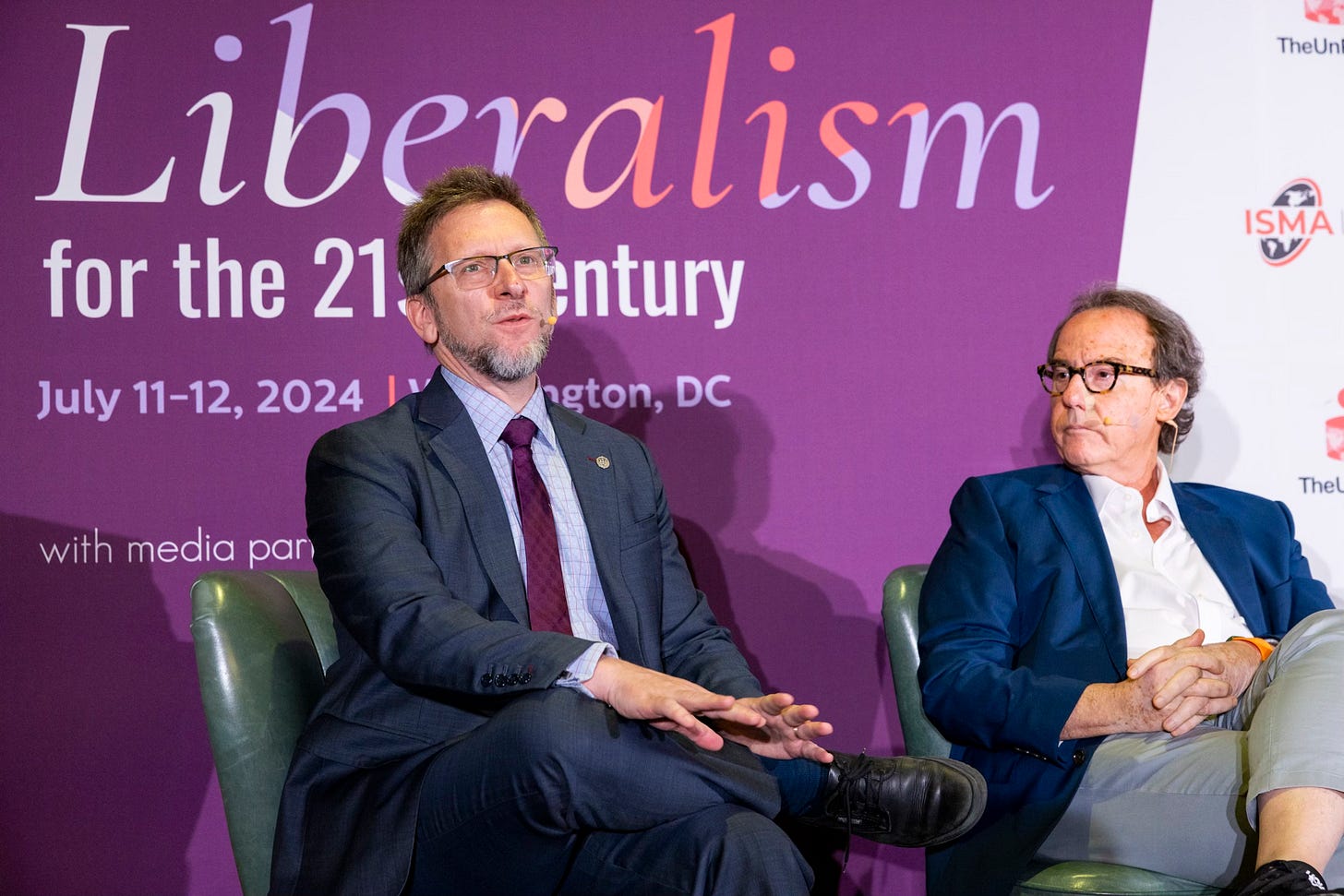

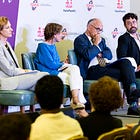

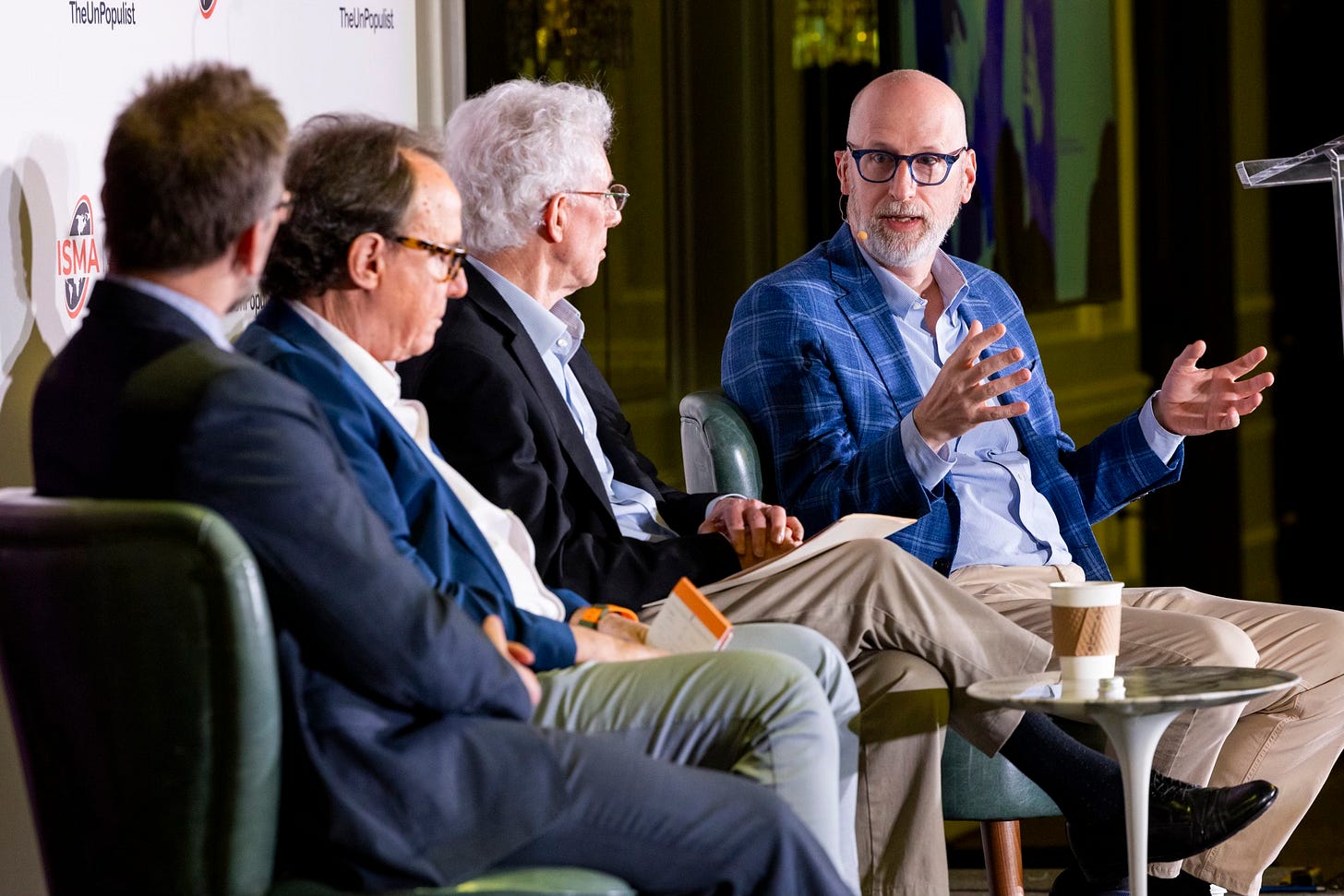
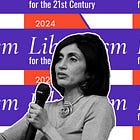
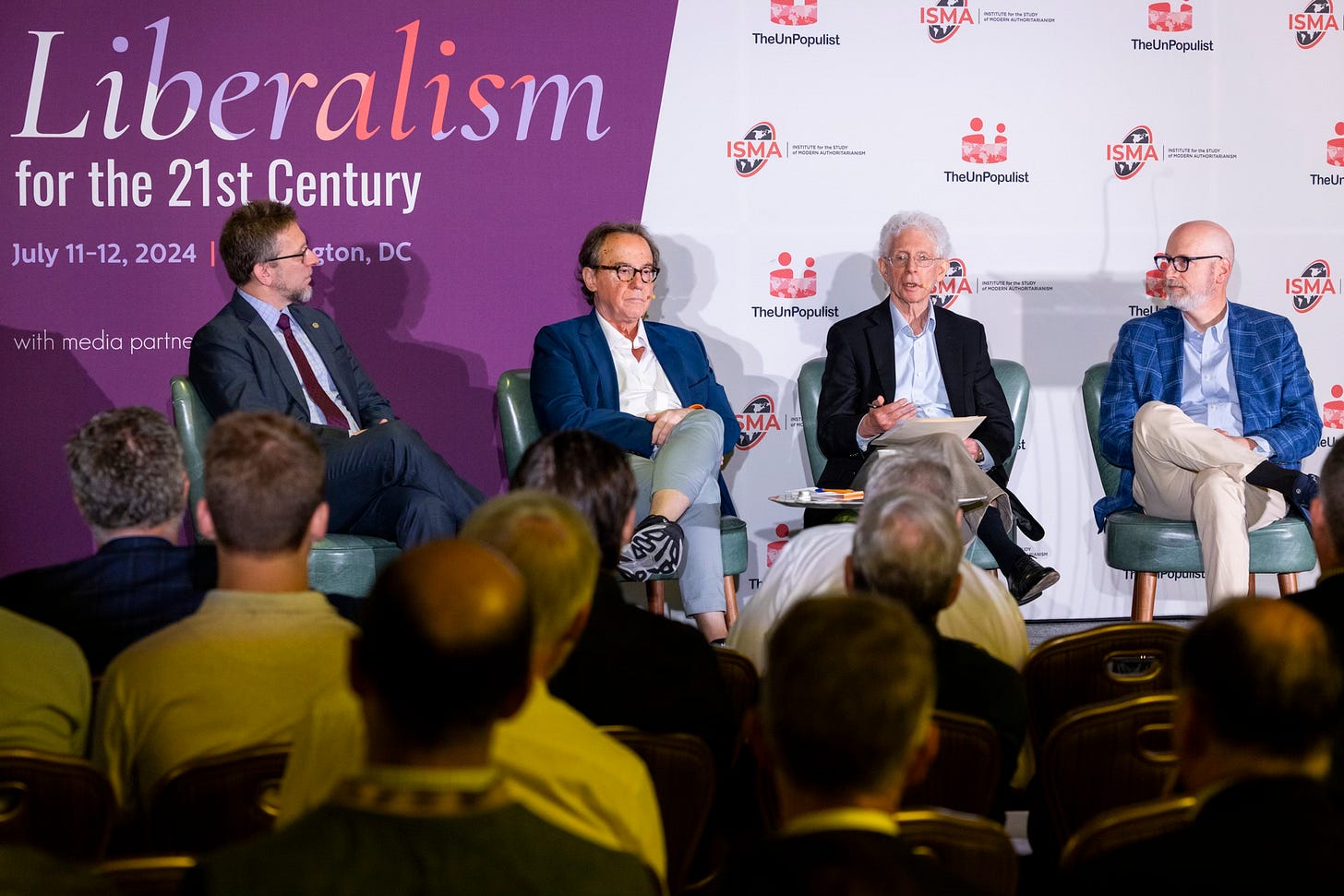

What’s new is the left’s outward embrace of decidedly illiberal policies and positions - so much so that it prompts one to wonder whether the left was ever sincere, or using liberalism as a convenient excuse/post-hoc rationalization for degeneracy. Gosh, that’s a tough one. A real puzzler . . .
I think everyone is pretty well familiar with these right-lane critiques of liberalism. They aren't exactly complicated.
Can we have a little defense of liberal society from left-lane critique? If you weren't aware, the ball can gutter on either side.